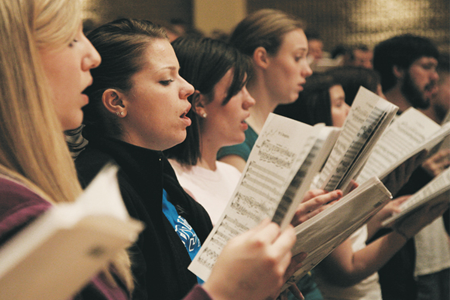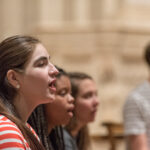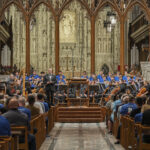I Hear :: I Forget // I See :: I Remember // I Do :: I Understand
-Chinese Proverb
This pedagogical tool is commonly known in educational circles as one of the most basic and foundational principles linked to student achievement. I recently read an expanded version of this concept with some numbers attached:
“To summarize the numbers (which sometimes get cited differently), learners retain approximately:
· 90% of what they learn when they teach someone else/use it immediately
· 75% of what they learn when they practice what they learned.
· 50% of what they learn when engaged in group discussion.
· 30% of what they learn when they see a demonstration.
· 20% of what they learn from audio-visual.
· 10% of what they learn when they’ve learned from reading.
· 5% of what they learn when they’ve learned from lecture.” [From “How to Retain 90% of Everything You Learn,” <http://www.psychotactics.com/blog <http://www.psychotactics.com/blog/art-retain-learning>]
I have just completed my first year of university teaching at Lee University in Cleveland, TN. It has been an incredible experience! Lee places a heavy emphasis on excellence in teaching. It is not just enough to show up and lecture, much to my surprise. As I prepare for class day after day and week after to week, I have been challenged to include all of the above methods in my pedagogical arsenal. Certain material lends itself better to a specific strategy, so including all of these methods in one class is not practical (or possible); however, I want to avoid “pedagogical predictability.”
Please do not confuse this with consistency, however. Students do value consistency, especially those in your church student choir. Deep down past the insecurities and egocentrism of adolescence, they want to consistently experience growth, development, and productivity in multiple arenas (spiritual, emotional, social, physical, musical, etc.). But we are more effective when we engage in that noble (and difficult) enterprise by using less-than-predictable strategies.
So take a moment now and imagine your student choir rehearsal. Picture it: your rehearsal plan, the overall agenda, announcements, the students themselves, their faces, etc. Now try to think of how to incorporate one of the above teaching strategies into that time. What would your rehearsal look like if you did not always stop rehearsal and start talking/lecturing or if you weren’t only practicing—I know that sounds like heresy! Just think of how different your rehearsal environment would be if you engaged your students through a variety of active teaching strategies. Don’t be afraid to change it up a little bit. Be creative in your approach.
So how might this look in real life? Let’s try a few examples:
Memorizing a section/piece.
· Have students gets in gender-specific pairs or trios and teach/drill each other on a specific section of a piece. Time them. Have them stand and face each other in little “huddles” all around the rehearsal room. Consider having these assignments set out in advance and possibly mix older and younger students. (Same age/friends will lead to random chatter.)
· Ask for volunteers (individuals or pairs/trios) to “show-off” their memorization of the section. They do not have to sing it, but at least walk through the words. Everybody really listens in.
· Talk about the meaning of the words of a section that is being memorized. Have someone come up and write out a list of themes/anchor points or words that help students follow the “metanarrative” of that section’s lyrics.
Better tone from [insert voice part]. As an example, we will use the tenors. (The usual culprit.) J
· Have the tenors sing the passage in question. Ask members of another voice section to describe the sound/tone of the section. Ask members of another voice section to suggest ways it might be better. Ask members of another voice section to recommend solutions (you’d be surprised what they might say; obviously don’t be afraid to offer guidance.)
· Ask the tenors to re-demonstrate. Ask the tenors to provide feedback and tell if they think they made the correction. Ask members of another voice section to provide feedback. You provide feedback.
· You demonstrate the solution if the problem persists.
· If the problem still persists, identify a senior or leader that can demonstrate correctly.
· Don’t beat a dead horse. Come back to it later if necessary. Plan to work this in warm-up or sectional time if necessary.
Servant ministry (tour prep)
· Instead of saying why this is important to do (whether its painting, cleaning toilets, mowing lawns, canvassing, neighborhood cleanup, backyard Bible clubs, etc.), ask some critical thinking questions about these mission endeavors. For example, “why do we give up a week and pay money to go and do this?” Or…“Since we are being a help to someone, shouldn’t we get to go for free?” Or…”What kind of temporary impact does this make?” Or…“What kind of long-term/eternal impact does this make?” Or…“Why should students be expected to do this. Shouldn’t adults be the ones to do this since they are older, more mature, and can do more?’ ”
· Backyard Bible Club prep:
o Have leaders teach the younger students the ropes of leading an effective club, whether its games/bible story/craft, etc.
o Don’t tell students how to tell the bible story in an engaging way. Have them actually practice telling the Bible story in an engaging way. Have an older student/adult demonstrate this. Have the students practice making the craft.
o Instead of talking about what will happen during a normal BYBC day when you get on tour, set up a mock-run through at the local park. Invite kids from the community.
I know what you are thinking. “But I only have (fill-in-the-blank) minutes. I cannot afford to do this.” Exactly…all the more reason to be intentional in planning how you incorporate only 1-2 of these elements in your rehearsal time. I would argue that you cannot afford not to do this. Just try it…change it up.
I Hear :: I Forget // I See :: I Remember // I Do :: I Understand










